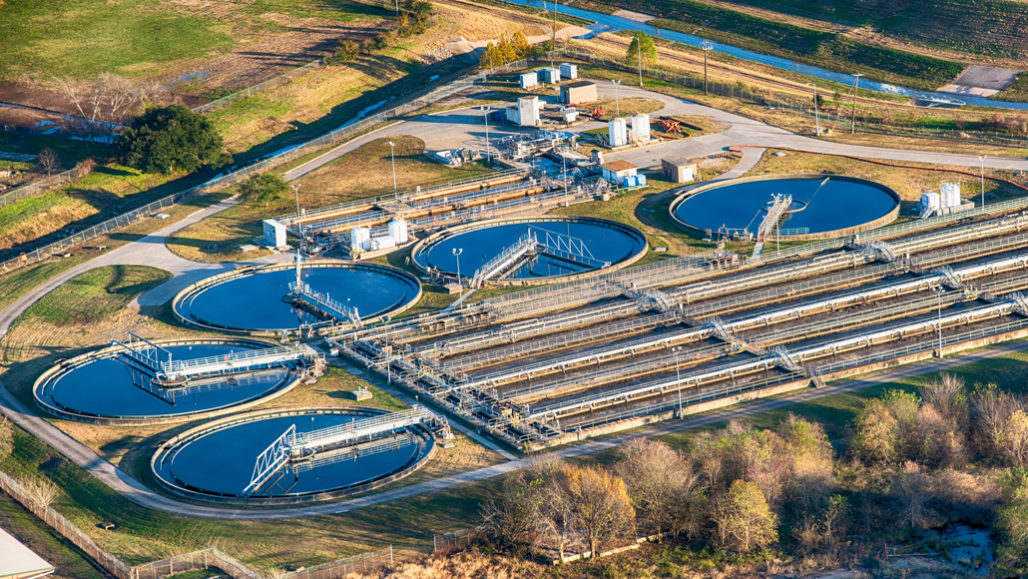Wastewater could provide up to a week of warning for a COVID-19 spike / Le acque reflue potrebbero fornire fino a una settimana di preavviso per un picco COVID-19
Wastewater could provide up to a week of warning for a COVID-19 spike / Le acque reflue potrebbero fornire fino a una settimana di preavviso per un picco COVID-19

Genetic material from the coronavirus can be detected in patients’ stool and wastewater from water treatment plants, like this one just south of Houston. A new study adds to evidence that sewage may serve as an early warning signal for COVID-19 hot spots. / Il materiale genetico del coronavirus può essere rilevato nelle feci e nelle acque reflue dei pazienti dagli impianti di trattamento delle acque, appena a sud di Houston. Un nuovo studio aggiunge prove che le acque reflue possono servire come segnale di allarme precoce per i punti caldi di COVID-19
ART WAGER/ISTOCK/GETTY IMAGES PLUS
Finding coronavirus RNA in sewage may signal that people in a community are infected.
Monitoring sewage for the coronavirus’s genetic material could give public health experts up to a week of warning before COVID-19 cases peak in an area, a new study finds.
Scientists have found the coronavirus’s RNA in stool from some COVID-19 patients. Though it remains unclear whether the virus can be transmitted through feces, researchers have also detected coronavirus RNA in raw wastewater. Because most people don’t get tested for the virus until they begin to get sick, and some may never develop symptoms (SN: 4/15/20), researchers are considering using sewage to look for early signs that the virus has hit a community.
In Connecticut, the amount of the virus’s genetic material in sewage peaked a week before the number of cases in one region did, researchers report in a preliminary study posted May 22 at medRxiv.org. Hospitalizations related to COVID-19 hit their highest point three days after RNA levels did.
From March 19 to May 1, researchers collected sludge — which contains solids that can settle out of water — from a wastewater treatment facility in New Haven. The team tested the sludge for coronavirus RNA, and then compared the amount of RNA in those daily samples with the number of new COVID-19 cases and hospital admissions in the region.
The study “shows that we can monitor wastewater in cities to get an early warning of when coronavirus outbreaks will occur,” says Aaron Packman, a civil and environmental engineer at Northwestern University in Evanston, Ill., who was not involved with the work.
Public health experts already use wastewater to track pathogens like poliovirus, norovirus and antibiotic-resistant bacteria. Such surveillance for the coronavirus could help pinpoint areas where cases will soon be on the rise.
And as states begin to loosen social distancing guidelines designed to curb the spread of the coronavirus, samples from wastewater treatment plants, along with widespread diagnostic testing and contact tracing, could help experts flag when to implement local control measures to slow the virus’ spread (SN: 4/29/20).
“It’s far better to get an early warning than waiting until you have large numbers of sick people,” Packman says.
ITALIANO
Trovare l'RNA del coronavirus nelle acque reflue può segnalare che le persone in una comunità sono infette.
Un nuovo studio rileva che il monitoraggio delle acque reflue per il materiale genetico del coronavirus potrebbe fornire agli esperti di sanità pubblica fino a una settimana di preavviso prima che i casi di COVID-19 raggiungano il picco in un'area.
Gli scienziati hanno trovato l'RNA del coronavirus nelle feci di alcuni pazienti con COVID-19. Sebbene non sia chiaro se il virus possa essere trasmesso attraverso le feci, i ricercatori hanno anche rilevato l'RNA del coronavirus nelle acque reflue grezze. Poiché la maggior parte delle persone non viene sottoposta a test per il virus fino a quando non iniziano a ammalarsi e alcuni potrebbero non sviluppare mai sintomi (SN: 15/04/20), i ricercatori stanno prendendo in considerazione l'utilizzo di liquami per cercare segni precoci che il virus sia nella Comunità.
In Connecticut, la quantità di materiale genetico del virus nelle acque reflue ha raggiunto il picco una settimana prima del numero di casi in una regione, hanno riferito i ricercatori in uno studio preliminare pubblicato il 22 maggio su medRxiv.org. I ricoveri ospedalieri correlati a COVID-19 hanno raggiunto il punto più alto tre giorni dopo i livelli di RNA.
Dal 19 marzo al 1 maggio, i ricercatori hanno raccolto fanghi - che contengono solidi che possono depositarsi fuori dall'acqua - da un impianto di trattamento delle acque reflue a New Haven. Il gruppo ha testato i fanghi per l'RNA del coronavirus, quindi ha confrontato la quantità di RNA in quei campioni giornalieri con il numero di nuovi casi COVID-19 e ricoveri ospedalieri nella regione.
Lo studio "dimostra che possiamo monitorare le acque reflue nelle città per ricevere un avviso tempestivo su quando si verificheranno focolai di coronavirus", afferma Aaron Packman, ingegnere civile e ambientale presso la Northwestern University di Evanston, Illinois, che non è stato coinvolto nel lavoro.
Gli esperti di salute pubblica utilizzano già le acque reflue per tracciare agenti patogeni come poliovirus, norovirus e batteri resistenti agli antibiotici. Tale sorveglianza per il coronavirus potrebbe aiutare a individuare aree in cui i casi saranno presto in aumento.
E man mano che gli Stati iniziano a sciogliere le linee guida di distanziamento sociale progettate per frenare la diffusione del coronavirus, campioni provenienti da impianti di trattamento delle acque reflue, insieme a test diagnostici diffusi e tracciabilità dei contatti, potrebbero aiutare gli esperti a segnalare quando implementare misure di controllo locali per rallentare la diffusione del virus ( SN: 29/04/20).
"È molto meglio ricevere un avviso in anticipo piuttosto che aspettare fino a quando non ci sono molti malati", afferma Packman.
Da:



Commenti
Posta un commento